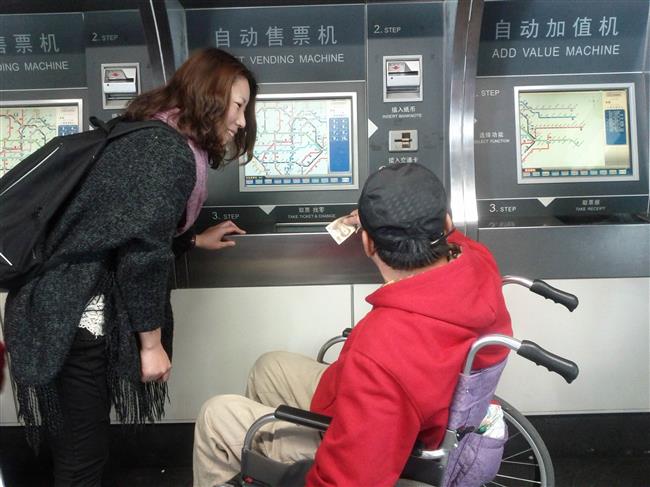A beacon of light for paraplegics

Xie Haixia helps a person affected by paralysis to buy a Metro ticket.
PEOPLE who suffer from permanent paralysis often fall into deep depression and feel there’s nothing left to live for. What they need is hope and confidence.
“Ninety percent of spinal-cord injury patients have thought about killing themselves, and many of them find that they’re not capable of doing even that,” said Xie Haixia, 40, a psychological therapist who helps paraplegics.
She leads a Shanghai Sunshine Rehabilitation Center team that has provided free services to more than 700 patients in the past six years.
For her dedication, Xie was honored among the 10 most outstanding volunteers in Shanghai in 2017.
“We never give up because we know that more than helping the patients, we are helping entire families,” she said.
There are an estimated 10,000 people in Shanghai suffering from spinal cord-related injuries and about 1 million across China.
Losing muscle function in limbs leaves most patients in wheelchairs, stuck at home, stigmatized and often distrustful of others. Xie said help from her team, when it was newly formed, was often rejected by paraplegics. But as word of the effectiveness of the service spread, doors opened.
When they first enter the Sunshine program, patients are told to focus on positives, not negatives — what they still can do and what they still have instead of what they have lost.
They learn to put on clothes from a prone position, slip into shoes with the help of a stick and get in and out of bed from and to wheelchairs on their own. They are also taught how to navigate streets in wheelchairs.
“Every little bit of progress boosts their confidence that they can live a normal life again,” Xie said. “We assure them that they’re not patients, but people with difficulties.”
The patients call each other shangyou, or “friends with the same injury,” and that’s how Xie also refers to them.
An essential part of the program is getting patients to accept that they can still be functioning members of families and society, debunking the feeling that they are a burden to others.
“When patients complain about the impatience of strangers toward them, we remind them that locking themselves up at home denies them the chance to meet kind-hearted people and avail themselves of social services.” Xie said.
As part of social integration, patients go on trips to grocery stores, banks and Metro stations, accompanied by volunteers ready to lend a hand if needed. Patients are also given roles to play, such as organizing a group dinner.
“Sometimes they have to use their lips to type onto a computer for an Internet search,” Xie said. “If they can’t do something themselves, others are ready to help. Slowly, they become more sociable.”
Pan Jing, who in her early 20s, was paralyzed from the chest down after a car accident. She is one of the patients who have benefited from Sunshine rehabilitation.
“I used to break down when people called me disabled, but now I don’t mind it at all,” she said. “I am even more confident than before the accident.”
Xie’s team has trained about 400 patients as instructors in the program. About 50 patients and their family members have joined 200 volunteers to give online help to spinal-cord injury patients around China. The mission is called Dandelions.















